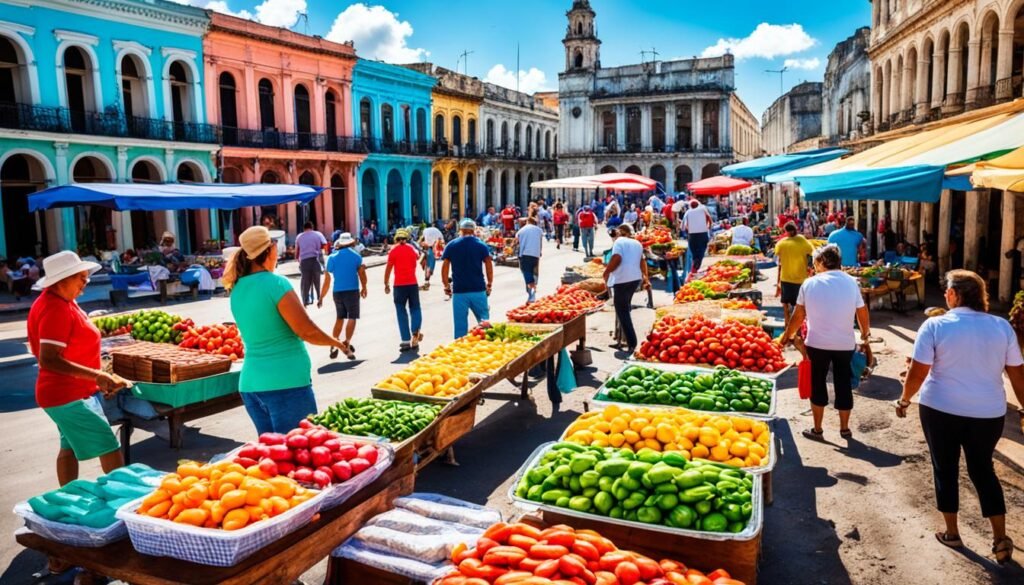For those looking to invest in Cuban real estate, understanding the landscape is pivotal. Buying property in Cuba comes with unique challenges, particularly in the realm of financing options in Cuba, where the historical backdrop shapes today’s property investment opportunities in Cuba. In December 2015, talks between U.S. and Cuban officials addressed the $1.9 billion worth of American assets seized by the Cuban government, a figure that underscores the complexity of the financial environment in Cuba for investors1. Moreover, the property claims against the Cuban government, which now range from $6 to $8 billion, indicate the significant stakes involved in the real estate market there1.
Key Takeaways
- Recognize the historical context affecting financing property in Cuba.
- Navigate mortgage options in Cuba with current market knowledge.
- Capitalize on property investment opportunities in Cuba.
- Understand the importance of the Cuban Liberty and Democratic Solidarity Act in normalizing U.S.-Cuba relations.
- Consider the role of legal tribunals in resolving Cuban property claims.
Understanding the Cuban Real Estate Market
As the Cuban real estate market evolves, understanding its intricacies has become vital for buyers, sellers, and investors. Since the market’s opening in 2011 for the buying and selling of private property2, it has shown unique characteristics shaped by its legal framework, regulations, and government involvement. Despite these developments, numerous challenges persist, including unresolved claims on properties and constraints on foreign ownership.
Legal Framework and Foreign Ownership
The legal framework of the Cuban real estate market largely permits sales transactions to be conducted by Cuban citizens. However, foreign investors face limitations, with the market currently only open to Cuban citizens2, thus broadly excluding foreign ownership. This restriction significantly impacts the inflow of international investment, as evident from the cash-only system that defines the market2.
Navigating Cuban Regulations with Qualified Assistance
To effectively navigate through the regulations of the Cuban market, one must consider that up to 50% of real estate sales in Cuba bypass real estate agents2. This indicates a marked difference from more mature markets where professional agents often handle transactions. Moreover, real estate agents, when involved, typically take a 5% fee for their services2. Consequently, securing qualified assistance is essential for a smooth transaction, given the lack of internet access that continues to hamper real estate activities2.
Government Involvement and Process Differences
Government involvement in the Cuban real estate market is another dimension that influences the property landscape. Significant concerns regarding property rights stem from historical seizures dating back to 19622. Moreover, the continuation of US economic sanctions poses additional challenges, dampening the potential for foreign investment2. However, with political changes, such as the normalization of US-Cuba relations, the market’s potential could rise substantially2.
The Role of Estate Agents and Agencies in Cuba
Understanding the dynamics of Cuba’s real estate market is crucial for anyone interested in a property search in Cuba. Since the monumental shift in 2011, when Decree-Law 288 granted Cubans and foreign residents the ability to buy and sell homes, the market has been transformed3. Estate agents in Cuba have become pivotal in navigating these waters, especially given the fact that 84% of households in Cuba own their homes3.
With no mortgage finance available, real estate agencies play a key role in facilitating transactions in a market primarily driven by upfront cash sales3. As local demand often grapples with liquidity constraints, and nearby Cuban Americans and other foreigners search for a foothold through local intermediaries, estate agents are the linchpins of property acquisition3.

The legal requirement in Cuba that real estate transactions be registered before a government notary highlights the importance of trusted estate agents who understand the legal intricacies3. They also assist in ensuring property title updates and registrations, which have seen an increase post-reform3. These agents have adapted to a unique environment where, prior to 2011, private sales were almost non-existent, and unauthorized cash sales prevailed3.
The introduction of formal property sales unleashed a pent-up demand, yet the shortage of residential units remains a pressing issue3. In this context, estate agents help retirees in selling their homes to downsize, effectively injecting more properties into the market3. This limited inventory and the allowance for ownership of a primary and a vacation home in Cuba make the role of an agent or agency crucial to success in property acquisition3.
An experienced estate agent thereby becomes an indispensable ally for anyone embarking on a property search in Cuba, providing guidance through a market characterized by unique regulatory requirements and a distinctive buyer-seller landscape3.
Financing Property in Cuba: Options and Challenges
Navigating the realm of financing options in Cuba can be a complex venture, marked by a unique set of challenges of financing property in Cuba. Despite significant homeownership, with 84 percent of households in Cuba owning their homes3, historical and current government regulations have shaped the landscape of real estate transactions. The 1984 law, which required state authorization for the sale of housing between private parties3, and the comprehensive 2003 law, which instituted a prohibition on housing sales3, have given way to a modernized approach.
The pivotal Law 288, enacted in 2011, marked a milestone by legalizing residential real estate sales and allowing Cubans and foreign nationals legally residing in Cuba to set their prices3. This law has spurred an increase in property titles being updated and registered3; a reflection of growing activity and autonomy within the market.
Nonetheless, securing mortgage options remains a challenging endeavor, given the nascent stage of financial services relating to real estate. Prospective buyers, including Cubans capitalizing on the post-legalization era, often find that engaging with Cubans living on the island is a necessary step to navigate these obstacles3.

As a result of these progressive policies, transactions no longer require the same level of state interference, with legal transactions simply needing to be registered before a government official3. However, the lack of conventional mortgage options means that innovative financing options in Cuba must be explored. Potential investors should be cognizant of the fact that while the opportunities for property investment have improved, they still come with regulatory complexities and limited financing instruments.
| Year | Regulation | Impact on Real Estate |
|---|---|---|
| Pre-1984 | Restrictions on Housing Sales | Very limited market autonomy |
| 1984 | State Authorization Law | Permitted sales with state approval |
| 2003 | Housing Sale Prohibition | Sales halted entirely |
| 2011 | Law 288 | Legalized sales; promoted market activity |
Despite these advancements, the quest for financing options in Cuba is further complicated by an economy that heavily relies on cash transactions and a banking system that’s not widely accessible for real estate financing. It remains imperative for investors to conduct thorough research and perhaps seek collaboration with entities experienced in Cuban property transactions to circumnavigate these entrenched challenges of financing property in Cuba.
Property Investment Opportunities in Cuba

With the opening of the Cuban real estate market to citizens for buying and selling properties since 20112, the island has seen a gradual shift which presents unique property investment opportunities. This evolving landscape points toward potential market expansion and economic growth, promising for those with a keen eye for emerging markets.
Potentials for Market Expansion and Economic Growth
The unique circumstance of a cash-only market, where up to 50% of real estate sales occur without the involvement of real estate agents2, illustrates an embryonic market teetering on the brink of transformation. The introduction of reforms and the establishment of mortgage systems are expected to catalyze a significant market expansion as the island’s economy prepares to tap into new veins of growth. Read about the next big real estate investment for Americans, which delves deeper into the spectrum of potentialities in Cuba’s burgeoning market.
Commitment to Market Reforms as a Lure for Investment
Cuba’s forthcoming commitment to market reforms is a beacon for international investors, foreshadowing a surge in the demand for property investment once foreign investment embargoes are lifted and regulatory frameworks are smoothed out. With approximately $8 billion in commercial and private properties awaiting claim settlements2, the future narrative of Cuban market reforms could rewrite investment strategies on a global scale.
Impact of Strengthened Property Rights
As the Cuban landscape adapts to global financial currents, the establishment of strengthened property rights can be the linchpin in securing investor confidence. Historical complexities stemming from seizures of foreign-owned properties in 19622 add layers of intrigue to the present scenario, suggesting robust potential once the fog of legal uncertainties clears.
| Aspect | Current Scenario | Future Outlook |
|---|---|---|
| Real Estate Transactions | Cash-only, often agent-less2 | Possible mortgage system, greater agent participation |
| Investment Limitations | Limited to Cuban citizens, legal constraints2 | Expected easing of restrictions for foreigners |
| Internet Accessibility | Scarce, 1950s-like operation for agents2 | Development of digital infrastructure for market accessibility |
| Lending Framework | Not well established, hinders investment2 | Anticipated refinements to entice large-scale investment |
Transcending political and technological barriers, Cuba beckons as a market ripe for growth, where the promise of economic expansion and property investment awaits the savvy investor.
Assessing Economic Freedom and Property Rights
The evaluation of economic freedom and property rights within Cuba presents a complex picture of a nation grappling with the costs of stringent governance and the aspiration for financial stability. Despite gradual shifts, the legacy of centralized control under the Castro regime casts a long shadow on the government integrity of Cuba4. The implications on the welfare, health, and human rights of its citizens are paramount in understanding the intricacies of investing in this unique market.

Evaluating Property Rights and Government Integrity in Cuba
Property rights within Cuba have historically been tenuous, at best, with the government maintaining tight control over real estate and transactions. With an economy experiencing a substantial fiscal decline, to the tune of a 60% reduction over the past half-decade4, and the cessation of Soviet benefaction leading to annual losses between 5 and 6 billion dollars4, assessing the legitimacy of property transactions becomes complex.
The Importance of Judicial Effectiveness in Investment
When considering an investment in Cuba, judicial effectiveness is a key metric for assessing risk. Repressive policies and a lack of free democratic processes4, compounded by the only completely nondemocratic government in the Western Hemisphere4, challenge the notion that the judiciary can operate independently and in the interests of investors. This becomes particularly salient when evaluating disputes over property rights or the enforcement of contracts.
Fiscal Health and Its Relevance to Real Estate Investors
The fiscal health of Cuba directly impacts the real estate sector. Diminished trade with former Soviet bloc countries4 and a crippling of the overall economy rest as silent reminders that fiscal prudence is key to any potential real estate dealings in the country. The United States’ solidarity with the Cuban people’s aspirations for democracy4 and international condemnation of the human rights violations4 cast doubts on the immediate potential for normalized fiscal operations within this environment.
| Indicator | Current Status in Cuba | Consideration for Investors |
|---|---|---|
| Economic Decline | At least 60% in the last 5 years4 | High-risk investment environment |
| Loss of Subsidies | Between 5 and 6 billion dollars annually4 | Uncertain economic recovery timeframe |
| Democratic Processes | Repression and lack of free elections4 | Unpredictable changes in property law |
| Fiscal Health | Significant trade decline with former Soviet bloc4 | Need for cautious due diligence |
Conclusion
In reflecting on the complexities of financing property in Cuba, it is evident that investors must navigate a landscape shaped by historical, legal, and political factors. The anticipated delisting of Cuba as a State Sponsor of Terrorism is poised to reshape the financial terrain, as the recalculation of risk and compliance costs could create new investment pathways5. Moreover, with regulatory amendments from U.S. agencies signaling eased relations, financial institutions are encouraged to reassess the opportunities now unfolding5. Sharpened by the caveat of Cuba’s obligation under the Helms-Burton Act to redress $7 billion in expropriated property, there rests a formidable challenge pegged at a significant 10% of the nation’s GDP5.
From the legal perspective, the rigor of the International Claims Settlement Act of 1949 elucidates the stringent criteria for certifying U.S. nationals’ claims against the Cuban Government, particularly in the context of debts tied to nationalized entities and properties6. The intricate case of Mellon National Bank & Trust Company’s lost loan to Cia. Cubana de Electricidad underscores the nuances of such legislations, where the subtleties of ownership interests and nationalization decrees can pivot the fate of substantial financial claims6.
As this article culminates, our final thoughts reflect an evolving narrative of Cuba’s real estate environment—a dynamic fusion of historical legacies and currents of change. Thoughtful investors will recognize the significance of tracking legal developments and the ever-present influence of global politics on the practicalities of financing ventures within Cuba’s shores. This conclusion doesn’t mark the end but rather a segue into a period of promising reevaluation and engagement with Cuba’s property market. Stakeholders poised at the intersection of change possess an unparalleled opportunity to thoughtfully engage and shape the landscape of property investment in Cuba.
FAQ
How can I finance a property in Cuba?
There are different financing options available for property in Cuba, including mortgage options. However, it’s important to note that the Cuban real estate market operates differently from other countries. It is advised to consult with professionals who understand the local regulations and can guide you through the financing process.
What are the challenges of financing property in Cuba?
Financing property in Cuba can be challenging due to government regulations and restrictions. The Cuban government tightly controls the real estate market and sets limits on foreign ownership. Additionally, access to financing may be limited, and the mortgage options available may have different requirements compared to other countries.
Are there mortgage options available for purchasing property in Cuba?
Yes, there are mortgage options available for purchasing property in Cuba. However, these mortgage options are usually limited to certain categories of buyers, such as Cuban citizens or foreign residents. It is essential to consult with a knowledgeable professional who can guide you through the process and help you understand the available mortgage options.
What is the legal framework for foreign ownership of property in Cuba?
The legal framework for foreign ownership of property in Cuba is complex. While foreign individuals and entities can own property in Cuba, there are certain restrictions and regulations to navigate. It is advisable to seek the assistance of qualified professionals who can guide you through the legal process and ensure compliance with the Cuban regulations.
How can estate agents and agencies assist me in my property search in Cuba?
Estate agents and agencies in Cuba can assist international buyers in their property search by providing expertise and local market knowledge. They can help identify suitable properties, arrange property viewings, negotiate on your behalf, and guide you through the purchasing process. Working with a reputable estate agent or agency can simplify the property search and ensure a smoother transaction.
What are the property investment opportunities in Cuba?
Cuba offers potential property investment opportunities due to its market expansion and economic growth. The country has shown a commitment to market reforms, which makes it appealing for investors. The recent strengthening of property rights also has a positive impact on the real estate market. It is important to conduct thorough research and work with professionals to identify viable investment opportunities.
How do I assess economic freedom and property rights in Cuba?
Assessing economic freedom and property rights in Cuba requires evaluating factors such as property rights, government integrity, judicial effectiveness, and fiscal health. Property rights and government integrity play a crucial role in providing a stable and secure investment environment. Additionally, the effectiveness of the judicial system and the overall fiscal health of the country can impact investors’ confidence in the real estate market.
Source Links
- https://www.american.edu/centers/latin-american-latino-studies/cuba-archive-property-claims.cfm
- https://www.forbes.com/sites/omribarzilay/2015/09/09/cuba-the-next-best-real-estate-investment-for-americans/
- https://www.brookings.edu/wp-content/uploads/2016/06/Phil-Peters-Cubas-New-Real-Estate-Market.pdf
- https://www.govinfo.gov/content/pkg/PLAW-104publ114/html/PLAW-104publ114.htm
- https://www.venable.com/insights/publications/2015/04/closing-the-100mile-gap-delisting-would-bring-the
- https://www.justice.gov/fcsc/cuba/documents/1501-3000/2498.pdf
Comments